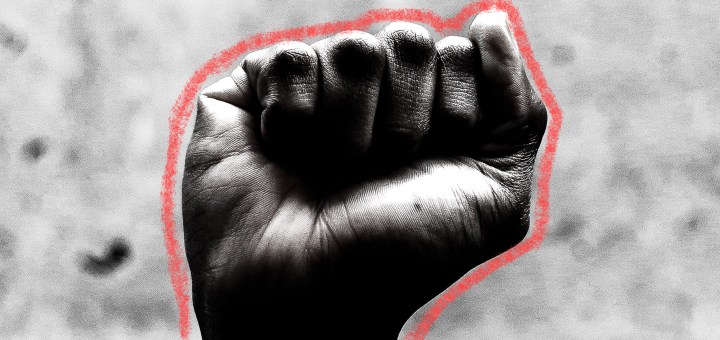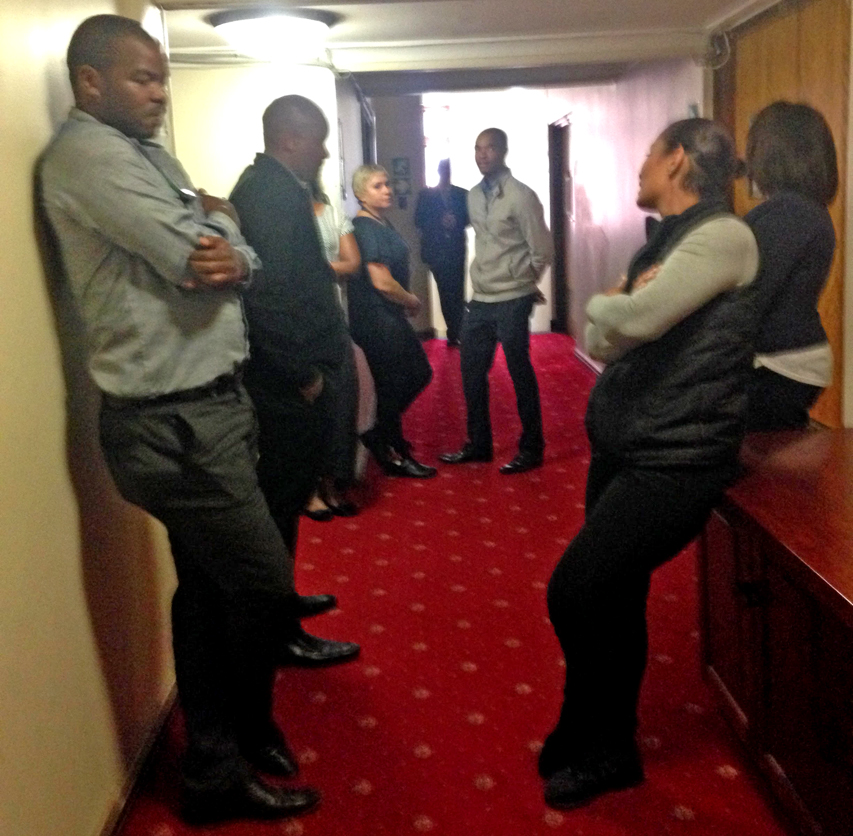Reporter's notebook
When Might is Right – Parliamentary committee’s closed meeting and bouncers-enforced media compliance

The bouncers stood at the ready as journalists peacefully left Wednesday’s water and sanitation committee. It was closed to the media after law enforcement made promises to provide “granular detail” on probes into multi-billion-rand departmental graft. It is unprecedented in Parliament for security to be called in as protection against the media. As it turned, out neither the Hawks, National Prosecuting Authority (NPA) or Special Investigating Unit (SIU) delivered the goods, never mind fireworks. Still, serious questions remain over parliamentarians’ willingness to close meetings when the constitutional bias — and parliamentary rules — are firmly for openness and accountability.
Black Wednesday, the annual commemoration of the apartheid regime’s 19 October 1977 closure of The World and The Weekend World and the arrest of Editor Percy Qoboza will fall on Friday this week. The day is commemorated precisely because media freedom and freedom of expression are central values in South Africa’s constitutional democracy, founded on openness, transparency and responsiveness.
While South Africa media freedom still ranks highly — third in Africa after Ghana and Namibia and 28th internationally, according to the 2018 World Press Freedom Index — increasingly concerns are raised over harassment and intimidation of media workers, and over access to information.
On Wednesday bouncers, officially titled chamber support officers, arrived in numbers at V227 to boost their two colleagues who had been there the whole day, just as the water and sanitation committee meeting turned to discussing closure. The possibility of closure emerged earlier in the day through an off-the-cuff remark in committee, raising a flag — there are certain parliamentary rules and procedures that need to unfold, which had not at that stage happened (more on that later).
The Hawks, National Prosecuting Authority (NPA) and Special Investigating Unit (SIU) were invited to tell MPs why the session should be closed. They said names would be named as well as charges arising from their respective probes, but caution needed to prevail not to prejudice those being investigated.
Those probes have been coming for a while, given the Water and Sanitation Department’s financial quagmire: it incurred R6.1-billion of irregular expenditure in the 2017/18 financial year, according to its latest annual report, up from just above R4-billion the year before.
Caution had to be exercised to “avoid legal risk” to the SIU or anyone mentioned in the presentation, was how SIU boss Andy Mothibi put it in committee discussions on closing the meeting.
“There are some outcomes which have not been made public. We are not in a court of law yet,” he told MPs, adding: “We are of the view that to avoid that legal risk is to have this session in a closed session to go down to granular level…”
Coincidentally, the SIU earlier on Wednesday told the justice committee it would want to brief MPs about those who are failing to implement recommendations and actions from their reports. Presumably such briefings would be in public, as failure to implement SIU recommendations apparently has been frustrating to the unit.
Hawks second-in-command Lieutenant-General Yolisa Matakata agreed, saying the session should be closed to “avoid any legal repercussions” on their continuing investigations.
NPA specialised commercial crimes head Malini Govender invoked the sub judice rule:
“We are obliged not to reveal any information to the public space that is under investigation… In respect to matters on court rolls, or anticipated to go on to court rolls, those matters are regarded as sub judice.” And discussing such matters was “a violation of the rights of other persons” the NPA needed to guard against.
After ANC MPs moved, and seconded, the decision to close the meeting — opposition MPs from the DA and IFP held different views — water and sanitation committee chairperson Lulu Johnson told the media they “are now excused”, adding: “We’re avoiding being a democrazy country. We’d rather be democratic all the time, all the way.”
While journalists started packing up gear to peaceably leave the now-closed meeting, around six of the bouncers entered the committee room. A phalanx of others, a quick count indicated 10, were standing outside the meeting venue as journalists emerged.

Bouncers waiting for media (Marianne Merten)
That moment seemed a new low point. Then it emerged the bouncers went on to search the committee room to ensure no journalist left behind recording devices. That marks another breach of trust in 24 years of a democratic Parliament, although it was unclear who gave the bouncers such instructions.
The only, lets call it, unauthorised listening incident happened many, many years ago when the ANC forgot to switch off the microphone system during its own caucus, and that meeting was broadcast on Parliament’s internal system.
The Parliamentary Press Gallery Association (PGA), which represents journalists accredited to work at the national legislature, on Wednesday afternoon wrote a letter of complaint to National Assembly Speaker Baleka Mbete.
All 16 journalists who found themselves the potential target of bouncers are accredited to work in the national legislature and know rules and practice. Said association secretary Paul Vecchiatto:
“We take great umbrage at Parliament stationing 16 bouncers at the committee room in what seemed like an attempt to intimidate journalists. Whether or not journalists agree with the committee’s decision, we always follow the rules of Parliament”.
Parliament spokesperson Moloto Mothapo said he was not immediately in a position to provide full comment: “We are trying to establish the facts with regard to the presence of allegedly 16 chamber support officers at the committee”.
Who called in the bouncers was not clear.
Water and sanitation committee chairperson Lulu Johnson told Daily Maverick he did not.
“No, not at all,” was his response to a direct question whether he called in security. “I only saw four (bouncers). I can assure you. They were searching if a recording device was left and were at the door so no-one gets into the committee room…”
Johnson confirmed what Daily Maverick earlier had reliably learnt, that what the SIU, Hawks and NPA told MPs “was no fireworks”, or even “eyebrow raising”. And that was raised with them there and then by the ANC.
“It was worth it (closing the meeting) when we deal with people’s names. The issues were not so much eyebrow-raising. The mere fact people’s names were raised (required) care.”
Why is any of this important?
Because just over R6.1-billion of taxpayers’ money is involved in the irregular expenditure incurred by the Water and Sanitation Department in the 2017/18 financial year. The department was in a shambles, Minister Gugile Nkwinti told Parliament soon after his appointment in late February when he took over from Nomvula Mokonyane, now communications minister.
Because longstanding water projects like the one in Giyani, which was meant to supply 50 villages with clean water, have stalled as contractors of the R3-billion project walked off due to non-payment, as City Press recently reported.
Because Parliament is constitutionally obliged to conduct oversight and hold departments and their ministers to account. And Section 59 of the Constitution makes it clear the National Assembly “must conduct its business in an open manner” and “may not exclude the public, including the media, from a sitting of a committee unless it is reasonable and justifiable to do so in an open and democratic society”.
For that reason there are rules and practice that has developed in the democratic Parliament. Rule 184 of the parliamentary rulebook allows committees be closed on matters “of a private nature that is prejudicial to a particular person”, protected under parliamentary privilege or law, or confidential in legislation, with the important additional criterion — if “confidential treatment is reasonable and justifiable in an open and democratic society”.
Meetings that are closed must be described as such on the Z-list, the daily list of committee meetings that detail what committee discusses what where from what time. Permission to close a committee meeting must be obtained from the Speaker, the political executive leadership of the institution. Once such permission is obtained, the committee in terms of the parliamentary rules must at the start of the meeting give “due consideration” to the reasons for closing the meeting, and take a decision.
On Wednesday, the Z-list did not indicate the briefing by the SIU, Hawks and NPA would be in a closed session. And it was insufficient for the chairperson to say the meeting would be closed during the earlier open session of Wednesday morning.
Journalists raised questions and their representative, the Parliamentary Press Gallery Association, engaged both House Chairperson for Committees Cedric Frolick, and Johnson.
When the committee resumed at 2pm, the correct process kicked in. Johnson informed everyone permission to close the meeting had been requested and obtained in writing on 12 October. And he explained the reason:
“Anyone out there being investigated may be prejudiced if we have an open session,” said Johnson, adding that for MPs to interrogate issues at water and sanitation it was important to get all the details.
There was a discussion, the ANC argued, about closing the meeting. The DA disagreed and the IFP suggested the law enforcement agencies should say what they were going to present so MPs could make an informed decision. And that’s where Mothibi, Matakata and Govender made their successful pitch to have the meeting closed — even if, by all accounts, they didn’t quite deliver on their promise of “granular details” into mismanagement and corruption investigations.
It’s not the first time MPs have come down in favour of shy officials, or those not wanting to talk in public. National interest, security and market sensitivity are the buzzwords.
In late September, the SAPS and Police Minister Bheki Cele raised concerns over discussing security in open committee in a meeting where MPs cautioned against using “a sledge hammer to kill a fly” regarding security at Parliament.
In June 2018 the finance committee allowed the Public Investment Corporation, the government-owned manger of more than R2-trillion of overwhelmingly workers savings and government employees pensions, to sidestep questions after invoking commercial sensitivities. And a resolution was adopted to allow SAA not to answer questions if they were market sensitive.
If committee meetings are being closed more and more regularly — on officials’ promise of dishing details — it would allow officials to hide from accountability. Considerations to minimise negativity, and the odd embarrassing question, may be particularly attractive in the months ahead of the 2019 elections.
But as always there will be consequences, even if these may only emerge sometime down the line. DM

















 Become an Insider
Become an Insider